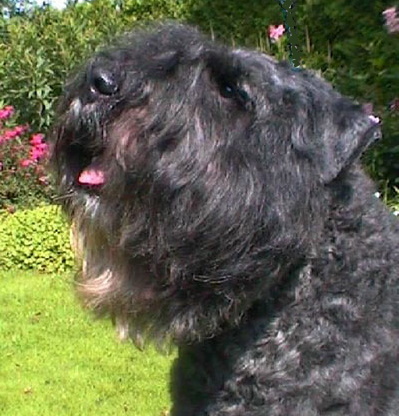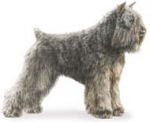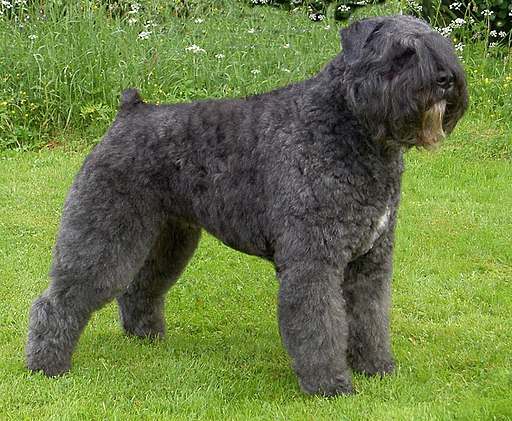Bouvier des Flandres
An Impressive Herding Dog!
The Bouvier des Flandres was originally bred for herding cattle and worked for centuries in the Flanders region between Belgium and France. He remains a working breed, but in more recent times has used his skills as an assistance dog, as well as security and police detection related work.
The Bouvier is a large dog, squarely built dog with an appearance that is both rugged and powerful. He has a proud and confident gait, a very full coat and his head is adorned with long eyebrows, whiskers and a beard.
The history of this breed dates back to the 16th century and is believed to have originated and been developed from
dogs brought to the Flanders region by Spanish crusaders.
The Bouvier des Flandres has well developed scenting
abilities which have been used very successfully in tracking and drug detection work.
Other not-so-flattering names associated with the breed include Dirty Beard (Vuilbaard) and Cow Dog (Koehond).
Characteristics of the Bouvier des Flandres
The Bouvier has many attributes that make him a very loyal and great family companion. He has lots of personality and is a cheerful and intelligent dog with an even disposition.
Owners say he is a bit of a clown and a fun dog to have around. He enjoys being primarily an inside dog and likes to maintain close contact with his family around the house.
He has natural protective instincts, coupled with an alert and fearless nature, making him a good watchdog, while at the same time maintaining a calm demeanor without any aggressiveness. Just the dog's impressive size would be a deterrent to a would-be intruder!
Being a very powerful dog, it is highly recommended that he receive some good obedience training. He is a dog that can learn almost anything if the handler's training approach is done with a kind hand.
This breed learns best with frequent breaks between training and play. Good training results in earning this dog's respect.

Physical Stats And Grooming
Height: 24-27 inches
Weight: up to 88 pounds
Color Variations: Fawn through black, including salt and pepper, gray and brindle
The Bouvier des Flandres has a very heavy coat that needs a significant amount of grooming. His outer coat is harsh and full and the undercoat is soft and dense, providing him with protection in all kinds of weather.
In addition to combing, daily brushing with a slicker brush along with a combination rake are good tools to use for maintenance of the coat.
Another excellent grooming tool, that gets high praise from dog owners, is the
FURminator DeShedding Tool.
We recommend that owners get their Bouvier used to grooming early on in his life.

Health Notes
If you are interested in acquiring a Bouvier puppy, be sure to ask breeders if screening of the parents has been done for the following health conditions which may affect the breed during their lifetime:
- Subaortic Stenosis - a congenital heart defect,
- Hip dysplasia,
- Glaucoma,
- Cancer,
- Thyroid dysfunction and
- Autoimmune disorders.
It is also a good idea to find out if the puppy has been tested for the
heart defect - which is best done around 6-8 weeks of age.
This breed has a high threshold for pain which makes is more important to be aware of his general health by giving him a
weekly checkup.
If you get into the habit of doing this, along with his grooming, it will alert you to any subtle changes in his condition that might be warning signs of a problem.
How Active is the Bouvier?
The Bouvier des Flandres does need a regular exercise routine that includes significant daily walks, or even jogging with his owner - when he has finished his full bone growth.
Bouvier Fun
 |
 |
 |
Ideal Living Space
The Bouvier des Flandres is not an outdoor dog per se, but he does need a considerable outdoor space where he can get exercise, play and run freely.
Once this is taken care of, he enjoys being back in the house with his
pack!
Does the Bouvier Get Along With Children?
The Bouvier has a gentle nature and an excellent reputation with children providing they have been taught consideration for pets and how to properly handle them.
As with any breed, to be on the safe side, all interactions
between pets and children should be supervised by an adult.
Suitable Pet For Seniors Or Less Active Families
The Bouvier des Flandres can make a very good companion for senior
owners or sedentary environments, providing sufficient exercise can be
arranged.
Photo Licenses:[CC BY-SA] Ygor Raiza
Further Reading

Bouvier Des Flanders: The Dogs of Flandres Fields
A comprehensive and practical guide to owning and caring for a Bouvier. A very worthwhile read for anyone interested in the breed. Includes historical data as well as information on grooming, training, breeding and much more.


